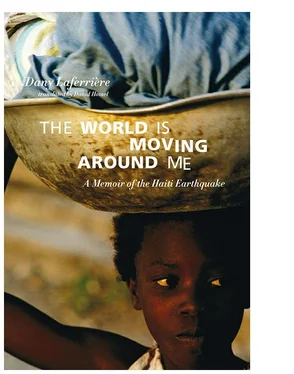On the Cross
Standing in the middle of the street, her arms raised, a woman is demanding answers from heaven. She has lost her whole family. She sees cruelty in the fact that she was spared. They were all at the table. She stepped out to get a dish that was cooking in the yard when everything started shaking. She had the presence of mind to save the food. When she turned around, the house was a heap of stones. She wants to know why she wasn’t allowed to die with her family. We wait for her to stop before going on our way.
At My Mother’s
My mother lives close to Frankétienne’s. We turn left at the first alleyway. My heart tightens. But the houses on her narrow, shaded street, by some miracle, look untouched. We drive slowly. The silence is unusual. As if the country had frozen. I have absolutely no idea what to expect. My heart leaps when I spot my brother-in-law (Christophe Charles, the poet) by the big red gate. He looks worried, but no more than he usually does. We leave the car by the wall. I see that the new house just across from my mother’s is completely destroyed. Nothing can be done. The owner was so proud of it. My brother-in-law’s thin smile reassures me. I figure that if something had happened, he wouldn’t be standing outside. But I try not to come to any hasty conclusions, because you never know. I shake Christophe’s soft hand, and he lets us go by. Everyone is in the yard, even my nephew Dany (we have the same name to keep the dictator, who pushed me into exile, from having the last word). A shiver runs through me when I realize Dany could have been at the university or somewhere else when the earthquake struck. By chance he’d stopped by the house, since he didn’t usually get home before nightfall. Delmas 31 is hard to reach (public transit doesn’t go there), and he has no car. Normally his father picks him up after class. But this time he was here. If my nephew hadn’t been there, my mother, who’s more than eighty years old (she won’t even tell me her age), and Aunt Renée, who can’t get around without help, would have been alone. And here they are, safe and sound, waiting for me. Aunt Renée is lying on a mattress that was thrown into the yard. She seems comfortable there. My mother is very excited. She takes me in her arms and whispers this litany into my ear: “I’ve seen it all in this country. Military coups, one hurricane after another, floods that wiped everything out, dictators who hand the country down from father to son, and now an earthquake.” She’s kept a detailed list of the natural disasters that have befallen us over the last two decades. I don’t know whether dictatorship should be included among natural disasters. It might be at the root of these misfortunes, or just their logical extension. My mother insists: “I’ve seen it all.” I stare into her wide eyes that have seen it all. That sadness lasts only a moment. My sister is making us bitter tea that is meant to lower our blood pressure. Aunt Renée grips my hand (hers is bonier than last time). The house doesn’t seem damaged. My mother takes me by the arm and shows me a little crack in the living room, and a much bigger one in the bathroom. Not too serious, but enough to worry her. But deep down, we are all so shaken that fear will be part of us for a long time. When it comes in such unexpected and massive fashion, death will not easily leave us. It’s so enormous that instead of casting us into sadness, I feel something like drunkenness come over me. Even my sister, who’s normally so care-worn, suddenly seems lighter. Today’s tragedies have erased yesterday’s worries. The feeling that we’ve finally hit bottom and can only go up. And the simple joy of still being alive.
My Nephew
I stepped into the yard with my nephew. The little shacks on the other side of the ravine had stood up to the earthquake. The old wall collapsed. We sat on the hood of the car.
“I’m going to write something,” I said.
“I imagine …”
“I’m going to write about this.”
I still couldn’t give it a name.
“I understand,” he said to me in a serious voice.
It’s like he’s matured overnight.
“What are you thinking about?”
A dog moved up the street. What could it live off, now that people are as destitute as it is? It looked thin and agile enough to find something to eat in the ruins.
“May I ask you something, Uncle?”
I sensed it was something serious.
“I’m listening.”
“I’d like to write something about this …”
“Nothing is stopping you.”
His head was lowered, but I could tell he hadn’t finished.
“What’s wrong?”
“I’d like you not to write about it.”
The boy certainly knew what he wanted.
“It doesn’t work like that, you know.” I showed him my black notebook. “As you can see, I’ve been taking notes non-stop.”
“No,” he said, laughing. “That’s not what I mean. You can write your journal, but not a novel.”
Completely taken aback, I listened as he explained in great detail that this is the event of his generation, not mine. Mine was the dictatorship. His is the earthquake. And his sensitivity will speak of it.
“I can’t promise you that. No one book takes the place of another.”
I gave him my point of view. In any case, that kind of novel isn’t up my alley. It would take a kind of power I don’t possess. Besides, nature has already written it. A grandiose novel in the classical style that features a time (4:53 in the afternoon), a place (Haiti), and more than 2 million characters. You’d have to be Tolstoy to take up a challenge like that. I watched his determined expression. Homer believed the gods send us misfortune so we might make poetry of it. Tolstoy, Homer: we picture ourselves like them before we start writing. But what if this young man has what it takes? Just as I was leaving, my mother slipped an envelope into my pocket.
The Parish
We had to make a long detour to reach the Delmas highway. I opened the envelope and found a picture of the Virgin inside. On the back, in pencil, in a trembling hand, it was written that this image had been blessed by the priest of Altagrâce, the church my mother has attended since the family moved to Delmas. It’s more difficult to adapt to a new church than a new neighborhood. When we were in Carrefour-Feuilles, she went to Saint-Gérard. She knew the church well, since it was the same one she attended when we lived in Lafleur-Duchêne, though we were a lot closer to Saint-Alexandre. She went to mass at Saint-Gérard for more than thirty years, which helped her get to know her neighbors. People meet at the market or at church. At first, she had all sorts of complaints about Altagrâce — even the priest’s accent exasperated her. She didn’t like the poor people there; they were too aggressive compared to the Saint-Gérard parishioners. But now she couldn’t picture herself anywhere else. You should have heard her heart-felt hallelujah when I told her Altagrâce had been spared. I have no news about Saint-Gérard, but people say that Carrefour-Feuilles is in ruins.
Trouillot’s House
We get to Lyonel Trouillot’s neighborhood. A group of people surround the car. They’re shouting and waving their arms. Finally I understand that someone is hurt and needs to be taken to the hospital immediately. Trouillot solves the problem by finding another car. The noise fades. We move slowly toward the house, since people keep hanging on to the car doors to give us news of the neighborhood. We sit in the small yard of a modest house. Plants growing everywhere. I breathe easier. A short time later, the oldest of the Trouillot brothers makes an appearance in a chair (he has trouble walking). He is set down next to us so he can be part of the conversation. Smiling as always, because nothing can get him down. Michel-Rolf Trouillot is the author of the first history of Haiti written in Creole: Ti dife boule sou istoua Ayiti . I met him in Montreal when he was working on the book. He was teaching in New York at the time. He couldn’t believe that there were no works of history in Creole, the language the slaves used to express themselves, the very ones who struggled to turn the colony into a country. For him, that was the whole point. He didn’t see Creole as the language of the heart, whereas French is supposed to be the language of the mind. Everyone knows Senghor’s formulation: “Emotion is black, and reason, Hellenic.” Trouillot’s view of Haitian history is Marxist. I remember those debates that dominated the 1980s. I can still see him leap to his feet to clarify a point of history and advance his Marxist vision of events. He wasn’t always this old sage who is sitting to my left, a peaceful smile on his lips. A shame that his health problems have kept him from continuing his research with the same intensity. We discuss what has happened, while all around us, people are running every which way as if we were in a war zone. Our calm attitude, which is only superficial, is designed to show others who are watching us from a distance that the situation is in hand. As they talk about this and that, the Trouillot brothers keep an eye on what’s happening. There’s a car that can take injured people to the hospital, but no driver. The yard seems to be the headquarters for neighborhood operations. Coffee shows up at the same time as the driver who heads for the hospital after downing a cup that will keep him from dropping from starvation on the way there. The coffee also helps us keep hysteria under control and makes our actions more efficient. The district is heavily damaged, but still, laughter can be heard. As we leave, we go past the Université Caraïbes that one of the Trouillot sisters is keeping alive single-handedly. It is nothing but rubble now. Dozens of casualties, they say.
Читать дальше












